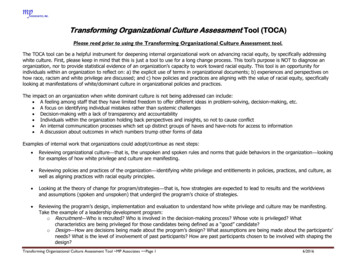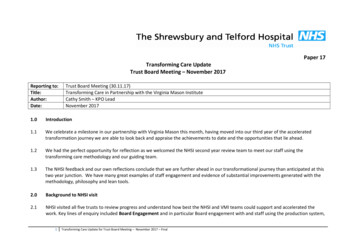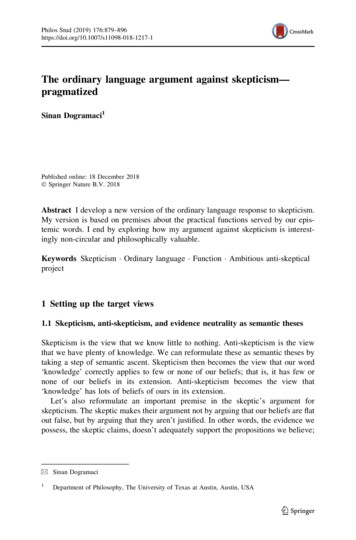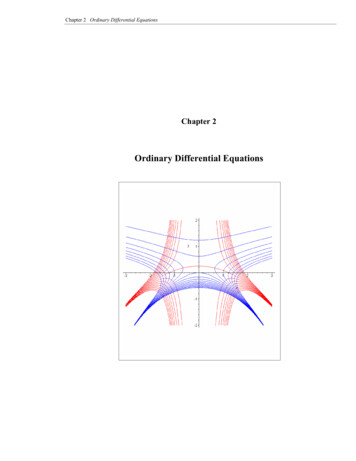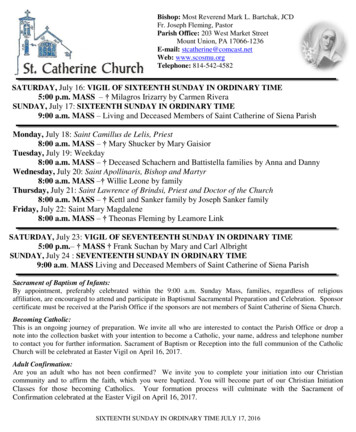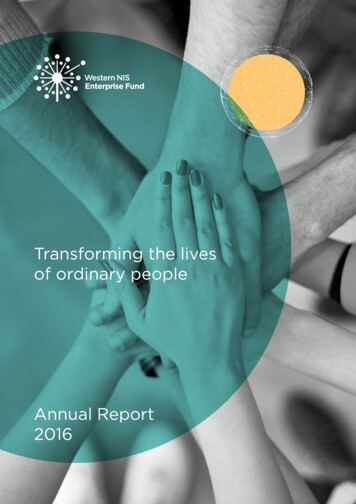
Transcription
Annual Report 2016Transforming the livesof ordinary peopleAnnual Report20161
Western NIS Enterprise FundThe Western NIS Enterprise Fund (WNISEF) is a 150 million regionalfund, a pioneering initiative in Ukraine and Moldova with over twodecades of successful experience investing in small and medium-sizedenterprises (SMEs). WNISEF was funded by the U.S. government via theU.S. Agency for International Development (USAID).The Fund’s original mission focused on developing small and mediumsized businesses, supporting solid corporate governance and transparency,and attracting additional capital to Ukraine, Moldova, and Belarus. Sinceits inception in 1994, WNISEF has provided loans, equity, grants, technicaland other assistance to companies operating in a variety of sectors. Thisincluded financial institutions, agriculture, manufacturing, and services.WNISEF has invested 168 million in 118 companies, employing over 25,000people in Ukraine and Moldova. Since inception, WNISEF has unlocked anestimated 1.5 billion of capital for Ukrainian and Moldovan companiesbased on the original 150 million grant from USAID.In March 2015, USAID approved the launch of a 30 million Legacy Programfunded by a portion of the profits earned from investment activities. Theprogram focuses on export promotion, local economic development,impact investment and economic leadership. In April 2016, USAID approvedi) expanding the Legacy Program to 35 million; ii) 5 million earmarked fordirect investments in SMEs, primarily start-ups; and iii) a 30 million commitmentto Emerging Europe Growth Fund III, L.P., a fund to be launched by HorizonCapital and focused on providing financing to SMEs in Ukraine and Moldova.This new activity inspired the wording for the new mission of the Fund:Transforming the lives of ordinary people in Ukraine and Moldova.Presently, WNISEF is funding innovative, transformational, reform-focusedprograms. The Fund aims to support both countries in this critical periodby fostering the development of sound economic policies and leadership.We are proud to share details of the second year of our Legacy Program,marked by the launch of new projects, the expansion of fruitful cooperationwith local partners and continuation of learning from hundreds ofindividuals involved in our projects in Ukraine and Moldova.USAIDUSAID promotes peace and stability by fostering economic growth,protecting human health, providing emergency humanitarian assistance,and nurturing democracy in developing countries. USAID’s work intransformational countries enables these nations to build the capacityto sustain their own progress. Since 1992, USAID has provided 2 billionworth of technical and humanitarian assistance to Ukraine to further theprocesses of democratic development, economic restructuring and socialreform in the region.www.ukraine.usaid.gov4
ContentsLetter from management.6Ukraine – key figures 2016.10Moldova – key figures 2016.14Export Promotion Policy Program.18Local Economic Development Program.26Impact Investing Program.32Economic Leadership Program.38Financial Statements.44Western NIS Enterprise Fund Directory.765
6
Annual Report 2016Letter frommanagement7
After a tragic 2014 and a tough 2015, the year 2016 allowed Ukrainiansto perceive their present in brighter colors. Despite the continuing warin the East, the country made undeniable progress. We are pleased andhonored to be at the forefront of this change.The European Union, in their report on Implementation of the EU-UkraineAssociation Agreement, called the reforms across Ukraine’s economy andpolitical system intense and unprecedented. Although the country still facesmajor difficulties, it managed to stabilize its economy and started growingin the third quarter of 2016. Ukraine took considerable steps towardscombating corruption, such as implementing structural reforms in theenergy sector, public procurement reform, cleansing of the banking system,e-declarations of wealth by public officials, deregulation, and improvementsin corporate governance. Also, worthy of mention are the undertaking ofdecentralization reforms and groundbreaking changes in education.Moldova has also made notable progress through 2016. The beginning ofthe year saw appointment of a new government putting an end to monthsof political uncertainty. Furthermore, the first direct presidential electionssince 1996 took place. A crucial outcome of this political stability is thatthe country stays adherent to its European course.The second year of the WNISEF Legacy Program proved the importanceand effectiveness of technical assistance for societies in transformation.Two years ago, we chose four priority areas as the focus for ourassistance: export promotion, local economic development, impactinvesting and leadership development. Each of these four programssuccessfully provided impetus for transformation of Ukraine’s andMoldova’s economies.We saw a significant passion for change and cooperation in many of ourpartners: from government officials and local authorities to big business,small enterprises, NGOs, and individual activists. In 2016, we expandedour cooperation within Ukraine by involving more local companies, cityand regional authorities and citizen initiatives into joint projects. Weappreciate our partners’ efforts in supporting the change driven bypeople. We believe that the initiatives we start together can expandfurther beyond the Fund’s support.Our belief is reinforced by significant achievements made during the secondyear of the Legacy Program.In August 2016, the WNISEF-backed ProZorro electronic procurement systemfor government tenders became obligatory for every public institution inUkraine. WNISEF was one of the first institutions to support ProZorro andhas championed the development and expansion of this important initiativesince its launch. This initiative has been cited as one of the most successfulreforms implemented in Ukraine. The platform has saved the state nearly 1 billion, as of the date of release of this report, promotes transparency,creates a level playing field for all enterprises, including SMEs, competingfor government contracts for goods and services and is an important anticorruption tool. Although ProZorro was developed in Ukraine, through theefforts of its team and institutional backers, the system is being launchedin Moldova and is expected to yield similar, impressive results. WNISEF isdelighted to be a first backer of ProZorro and to continue this cooperationby supporting the launch of ProZorro.Sale, an electronic auction platformfor the sale of assets owned by the Deposit Guarantee Fund of Ukraine.8
Annual Report 2016Another important program that WNISEF has founded and financing, incooperation with the Government of Ukraine, is the Investment PromotionOffice (IPO). IPO is an advisory body to the Prime Minister focused onattracting investment to Ukraine. The objective of IPO is to assist in attractingforeign direct investment to Ukraine. The work of IPO complements theefforts of the Export Promotion Office (EPO), which was launched togetherwith the Ministry of Economic Development and Trade of Ukraine (MEDT)last year and addresses the other side of the coin, specifically, supportingthe export of Ukrainian goods and services. During the year, we alsosupported the MEDT’s development of a National Export Strategy forUkraine, which was presented for stakeholder review by the Government ofUkraine in the first quarter of 2017. In collaboration with two bank partnerswe launched a low-interest loan program for social enterprises and allocatedthe first loans to three social-impact businesses. Expanding on the firstUkrainian Leadership Academy launched in Kyiv in 2015, we established fouradditional Academies in Poltava, Lviv, Mykolaiv and Kharkiv in 2016, therebyenrolling 200 new students for the second year of the program. We alsoawarded eight SEED Grant scholarships to Ukrainian and Moldovan studentsadmitted to the best MBA schools in the United States, two scholarships forstudy in MPA programs in the United Kingdom and two LLM scholarshipsfor study in the United States. We are delighted to welcome the first fiveMBA graduates-recipients of SEED Grant scholarships to the region in thecoming year.In cooperation with CANactions School for Urban Studies, we started asmall urban grants program and saw the first seven projects implementedin different Ukrainian cities. As a result, we launched an independent smallgrant program DREAMactions, and by the end of 2016 awarded 10 moresmall grants for the second round of projects. Finally, in 2016 we held thefirst International Mayors Congress, which is to become an annual platformfor Ukrainian and foreign mayors to exchange experience and share theirbest practices.Two years is not a long period of time since we launched the Legacy Programyet we already see concrete results and great potential for our activities inUkraine and Moldova. Still there is much at stake in these counties andclear reason to support and reinforce the important initiatives that we havelaunched to date.We would like to thank all members of the WNISEF Board of Directorsand team, USAID in Washington and the Missions in Ukraine and Moldova,the U.S. Embassy in Kyiv and Chisinau and our business and governmentpartners for their contribution to the development of democratic values andeconomic prosperity in Ukraine and Moldova.Together, we can achieve more sustainable changes in the region andtransform the lives of ordinary people in Ukraine and Moldova!Sincerely,Dennis A. Johnson,Chairman of the BoardJaroslawa Zelinsky Johnson,President and Chief Executive Officer9
10
Annual Report 2016Ukrainekey figures 201611
2016 was a year of economic stabilization and the beginning of growthfor Ukraine. The country showed signs of recovery despite the ongoingconflict in the East, a difficult external environment, and a severe economiccrisis. After a 9.8% drop in 2015, GDP grew by 2.3% in 2016. While thesocial and economic cost of the crisis was high, growth is expected to behigher in 2017.The new coalition government of Ukraine appointed in April 2016declared its commitment to further implementation and strengtheningof economic reforms. A two-party coalition holds a fragile majority inparliament which sometimes challenges policy making.Nonetheless, the economy stabilized through 2016 showing signs ofa gradual recovery which improved the confidence of government,business, and society. Business activity picked up. Industrial productionregained competitiveness and de-escalation of the conflict in the Eastcontributed to an increase in coal and metal production. At the sametime, output in agriculture and consumer goods sectors was better thanexpected and demonstrated the broad-based nature of the recovery.On the macroeconomic level, inflation receded quickly from 43.3% in2015 to 12.4% in 2016. Gross international reserves (including gold) grewto 15.5 billion in 2016; doubling through 2015-2016. Bank deposits indomestic currency also rose. This progress was mostly possible due tothe government’s sound macroeconomic policies.The Ukrainian government managed to cut the budget deficit significantlythrough rebalancing the tax burden. The 2016 tax reform slashed labortaxes, reduced VAT exemptions, simplified and rebalanced the tax systemtoward indirect taxes by increasing excise taxes on fuel, alcohol, andtobacco, while lowering the overall tax burden.Ukraine took several important steps to reform the energy sector byovercoming monopolies and creating sufficient gas and electricitymarkets. The country also raised energy tariffs to market levels.Additionally, crucially important laws were adopted including a law “Onthe National Commission for State Energy and Public Utilities Regulation”which provided the foundations for the creation of a transparent andcompetitive energy market in Ukraine. To further strengthen energyindependence, in 2016 Ukraine diversified the sources of gas and nuclearfuel supply, increasing the number of providers from Europe. Furthermore,the Energy Strategy of Ukraine for 2035 was developed and publishedfor wide public discussion.12
Annual Report 2016The government also undertook measures to rehabilitate the bankingsystem. The National Bank continued closure of weak banks and therecapitalization of remaining banks. The state also nationalized thebiggest banking institution Privat Bank to prevent its failure because ofcapital insufficiency.Considerable steps were taken to advance deregulation and to reformState Owned Enterprises (SOEs). New institutions were set up toimprove governance, including the Investment Promotion Office andthe Public-Private Partnership office of the Ministry of Infrastructure.New anti-corruption bodies such as the Specialized Anti-CorruptionProsecutor’s office (SAPO) and the National Anti-Corruption Bureau ofUkraine (NAB of Ukraine) were created in the wake of the Revolutionof Dignity to undertake steps old law enforcement bodies failedto do — overcoming corruption within state bodies.The year 2016 saw intensified government efforts to widen and developopportunities for Ukrainian exporters. The Ukraine-EU free trade area waslaunched January 1, 2016 and the Canada-Ukraine free trade agreement(CUFTA) was signed in July, providing new markets for Ukrainianexporters.Multilateral and bilateral creditors played an important role in continuingto support government reform efforts with significant financing andtechnical assistance. The country renewed its cooperation with the IMFand obtained a third tranche of 1 billion USD in September which allowedthe continuing gradual liberalization of temporary restrictions on theforeign exchange market.Government and the IMF experts expect macroeconomic growth tocontinue and strengthen in 2017 strongly depending on the progress 20.012.39.14.6(0.2)Average Exchange Rate, USD7.87.98.0Current Account Balance, %(1.5)(2.2)External Debt (USD billions)103.44.7Real GDP Growth, %Inflation End of Year, %FDI (USD billions, net)2013 s: International Monetary Fund, National Bank of Ukraine, State Statistics Service of Ukraine.13
14
Annual Report 2016Moldovakey figures 201615
In 2016, the Moldovan economy also rebounded, growing 4.1% year-onyear. The volume of remittances in 2016 totaled 1.1 billion, decreasingyear-on-year by only 4.4% after a significant decline of 30% in 2015. Themost significant growth driver was agricultural production, increasing18.6% in 2016.The country took considerable steps toward political stability, includingthe appointment of a new government at the beginning of the year andthe first direct presidential elections since 1996. However, political conflictremains in Moldova as the President and the Prime Minister continue tocriticize each other’s policies in relation to Russia and Transnistria.Though still influenced by the banking crisis and political uncertainty, thecountry’s economy showed positive signs of recovery. Consumer inflationslowed down through the year. Twelve-month inflation decreased from apeak of 13.6% in December 2015 to 2.4% at the end of 2016, due to goodagricultural output, lower import prices and weaker internal demand.This permitted the National Bank of Moldova to soften its monetarypolicy which was aimed at maintaining low inflation while supporting thefunctioning of a flexible exchange system. Simultaneously, the NationalBank of Moldova sharply reduced the base interest rate from a peak of19.5% in September 2015 to 9% from October 2016 which is crucial forsupporting the banking sector by unlocking healthy liquidity to growingsectors of the economy.Under the strong leadership of a new Governor at the National Bankof Moldova, solid measures have been taken to improve corporategovernance in the financial sector. Continuation of these efforts iscrucial to strengthening the independence and supervisory capacityof the National Bank of Moldova and ensuring transparency and goodgovernance in financial institutions.Meanwhile public finances of Moldova were under pressure due to delayswith external funding. The 2016 state budget was adopted only in July,and relied heavily on external funding (from the EU, World Bank, andRomania) to finance the planned deficit of 3.2% GDP. In the Januaryto July period, the state suspended most procurement and capitalexpenditures because of inadequate external financing. In November2016, the International Monetary Fund (IMF) approved a 178.7 million,three-year arrangements with the Republic of Moldova to support thecountry’s economic and financial reform program.16
Annual Report 2016According to IMF projections, Moldova’s growth is expected to reacharound 3% in 2017-2018. However, this calculation relies strongly onthe economic recovery of major trading partners and improved consumerand investor confidence, supported by an IMF program and the financingfrom other partners. To ensure fiscal sustainability, Moldova’s fiscal deficitshould gradually decline to 2.5% GDP.Macroeconomic and fiscal stabilization is an important short-termchallenge for Moldova. However, long-term sustainable progress requiresthe country to rebalance the drivers of growth, activating private sectorgrowth and job creation. Therefore, strategic challenges for Moldova for2017 include strengthening the accountability of institutions, raising thequality and relevance of education, improving the business regulatoryframework, and ensuring sound macroeconomic and fiscal .7)9.4Inflation End of Year, %0.48.17.84.1Average Exchange Rate, USD11.112.411.7Current Account Balance, %(8.2)(7.5)(11.7)Real GDP Growth, %2013 .819.9(7.5)(5.2)(5.3)(4.9)(3.8)Sources: International Monetary Fund, National Bank of Moldova, National Bureau of Statistics of the Republic of Moldova.17
18
Annual Report 2016Export PromotionPolicy ProgramGoing global throughtrade and investment19
Ukrainian life traditionally centers around the table, where families, friendsand business associates gather to break bread and socialize with oneanother. So, it is no surprise that participants, including Canada’s PrimeMinister Justin Trudeau, gathered around a table at the “Made in UkraineShowcase,” which featured over thirty WNISEF sponsored Ukrainianexport-ready manufacturers at the 2016 Canada-Ukraine Business Forumin Toronto. What was exceptional, however, was the table the participantsgathered around. It was Kodisoft’s innovative “smart table” with a touchsurface that allows multiple users to perform a whole host of functionssimultaneously from placing a food order to shopping on the internet toplaying games or watching video programs.Except for some imported components, this remarkable innovation andcenterpiece of Kodisoft’s Interactive Restaurant Technology has virtually100% Ukrainian content from its conception to production, including itsWindows OS based software. As explained by Kodisoft’s 29 year oldCEO and Founder, Dmytro Kostyk, “our product development involveda challenging eight-year process as we moved towards the realization ofour idea, step by step, from the original concept to the creation of ournew touch recognition technology. Now we mostly concentrate on salesdevelopment.”Supporting Ukrainian innovativeness and creativity, WNISEF ExportPromotion Policy Program decided to provide Kodisoft and the othersmall and medium-sized Ukrainian manufacturers, participants in the“Made in Ukraine Showcase” and “Fashion Show” at the Canada-UkraineBusiness Forum with the critical support needed to gain valuable marketexposure, identify potential business partnerships and promote theexport sales of their “Made in Ukraine” products.Based on the very positive response Kodisoft received to its InteractiveRestaurant Technology in Canada, WNISEF encouraged and supportedthe company’s participation in MAPIC 2016, the International RetailProperty Market Tradeshow in Cannes, and Ukrainian Innovation NightExhibit at Davos 2017 to highlight Ukraine’s high-tech capabilities anduntapped export potential.Mr. Kostyk subsequently reported: “We made contacts and had face-to-faceconversations with 352 people at MAPIC.20
Annual Report 2016This included meetings with CEOs and VPs of big shopping malls inSingapore, China, UAE, Saudi Arabia, and Turkey; and with the managingdirector of a company operating over 200 shopping centers across theEU. As a result of our participation, we received new orders for 67 tablesby the end of 2016 and expect to sell another 450 tables over the next24 months.”Kodisoft is only one example of the export-ready small and mediumcompanies that are benefiting from WNISEF’s numerous export promotionprogram activities. In 2016, WNISEF provided assistance to 107 Ukrainianand Moldovan companies that participated in 16 trade promotionevents worldwide. These young private enterprises from thirteenregions of Ukraine and Moldova participated in a variety of showcaseevents, government-led trade missions and international trade shows.In addition to gaining valuable marketing experience and internationalbusiness exposure, many of our participants succeeded in signing exportcontracts. RITO, a manufacturer of fashion knitwear started exportingto Lithuania with WNISEF’s support in 2015 and reported export salesfollowing participation in the Canada-Ukraine Business Forum. Whileanother apparel producer, Folkmoda, signed a sales contract with Auchan,an international retail chain, following its participation in the WNISEFsupported Ukraine-France Business Forum in October 2016.The Ministry of Economic Development and Trade of Ukraine’s (MEDT)official mission to Malaysia and Indonesia, organized by the WNISEFsupported Export Promotion Office (EPO), produced three memorandaof cooperation with Ukrainian producers Biofarma (a state-of-theart pharmaceutical company), Spetstechnology (fumigation and pestcontrol product and services provider), and MMI Group (developer of ITsolutions for business and government). A more recent EPO organizedtrade mission to Kenya and Tanzania was credited with a 119 millioncontract for the sale of Ukrainian corn to Kenya. In addition, 85% of themission participants reported the start of promising negotiations withprospective partners in these two countries.21
Trade promotion event22Number of companiesparticipated withsupport from WNISEFInternational Fashion Showcase 2016ITB 2016 Trade ShowChina Food and Drink Fair 2016Constructexpo 2016Budma 2016Interbud 2016Resta 2016IMEX 2016 Trade ShowRazom IT tripSVOD conferenceMade in Ukraine Showcase atUkraine-Canada Business ForumTrade mission to Malaysia and IndonesiaBaltic Fashion and Textile Trade Show 2016Toronto Ukrainian Festival 2016MAPIC 2016Trade mission to Kenya and TanzaniaVinitech-Sifel 2016 Trade ShowUnited manyUSAUSA1413171111631CanadaMalaysia, IndonesiaLithuaniaCanadaFranceKenya, TanzaniaFrance3012145181Business Forumssupported byWNISEF in 2016Location,dateTotal numberof participantsUkraine-NetherlandsBusiness ForumNootdorp,the Netherlands,March 30, 201635080Ukraine-CanadaBusiness ForumToronto, Canada,June 19-20, 2016450115Ukraine-FranceBusiness ForumParis, France,October 28, 201635030Number of Ukrainiancompanies participated
WNISEF continues to play a vital role in strengthening cooperationbetween MEDT and Ukraine’s business community through its on-goingsupport of the EPO. In addition to developing a national databasewith 3,500 manufacturers to improve the ministry’s communicationsand outreach to the business community, the EPO has established anExport Promotion Council as a platform to conduct and manage an ongoing dialogue on trade development with the business community.In 2016 over 300 companies participated in meetings of the ExportPromotion Council to provide input and feedback on issues related tothe government’s efforts to develop fair and transparent trade policiesand programs.At the same time, WNISEF is working to engage other donors andtechnical assistance programs that will enable the EPO to increase itscapacity to support firms like Kodisoft and others with a full range ofexporter services ranging from market intelligence to trade finance incountry and abroad.Through its Export Promotion Policy Program, WNISEF focuses onproviding direct support to trade associations and business organizationsthat are working on specific export promotion programs and servicesto benefit their members. Following program guidelines that arereadily available on WNISEF’s website, trade associations and businessorganizations may apply and potentially receive funding to cover up to50% of their project proposal to improve members’ trade potential andexport success. WNISEF grants supported the development of Ukraine’stravel and tourism sector through joint city exhibitions at WTM in Londonand ITB in Berlin. WNISEF supported both the Ukrainian pavilion atCES-2017, the Consumer Electronics Show in Las Vegas, and the UkrainianInnovation Night at Davos 2017, in cooperation with the Ukrainian VentureCapital and Private Equity Association. WNISEF also supported thepavilion of Moldovan wine producers at the China Food and Drinks Fair.Additionally, the WNISEF Export Promotion Policy Program supported theUkrainian Light Industry Exhibition in Vilnius organized by UkrLehProm,the Ukrainian Light Industry Association, and staged in conjunction withan official government trade mission to Lithuania.Fully recognizing the fact that trade and investment go hand-in-hand,in 2016 WNISEF supported the creation of UkraineInvest, an investmentpromotion office under the auspices of the Prime Minister of Ukraine.UkraineInvest focuses on supporting existing and new investors, makingconditions easier for all investors to do business in Ukraine and projectinga positive image of Ukraine to potential foreign investors.23
Last, but certainly not least, WNISEF has dedicated significant time,effort and resources to the development of a National Export Strategyand Five-Year Action Plan for Ukraine. The Strategy and Action Plan areintended to set national priorities and implement government policiesneeded to improve Ukraine’s international trade performance rapidlyand significantly. In line with this monumental undertaking, WNISEFhas supported MEDT and the EPO in organizing National StakeholderConsultations hosted in September and November 2016 in cooperationwith the International Trade Centre (ITC), a joint agency of the WorldTrade Organization and the United Nations. These consultations haveinvolved over 100 stakeholders, including: high-level government officials,members of parliament, business leaders, academicians, representativesof civil society and donors. The goal of this all-inclusive effort is toproduce a realistic export strategy that will be owned and championedby all who are genuinely concerned and committed to Ukraine’s futureeconomic development in the global environment.Vitaliy Bigdai, Export Promotion Policy Program Manager:Since the launch of our Export Promotion Policy Program inUkraine and Moldova in 2015, we have witnessed a remarkableincrease in export awareness among government officialsand business people alike. Whether attributed to the totalbreakdown in traditional trading patterns, the “Spirit of theMaidan”, or the signing of the Association Agreements andthe Deep and Comprehensive Free Trade Agreements with theEU, or a combination of all three developments, there is clearlya new sense of pride, ownership and entrepreneurship amonggovernment officials and business people alike. There is also anew and clear recognition among all that they can and shouldbe competing and succeeding in the international marketplace; and that by doing so they can and will strengthen theirinternational partnerships, secure their economic futures, andreinforce their nations’ sovereignty and independence.24
Annual Report 201625
26
Annual Report 2016Local EconomicDevelopmentProgramBuilding transformativepartnerships27
Mykolaiv, historically known as a city of shipbuilders, is a city of 489,000inhabitants in southern Ukraine. However, most of the city’s shipbuildingfacilities, founded back in the 18th and 19th centuries, are barelyoperational now. Despite being located near the Black Sea, the city hasno beaches and its industrial-style architecture hardly attracts tourists.Present day Mykolaiv seeks a new identity and new opportunities withthe help of WNISEF.“One of my priority tasks as a Mayor was to eliminate corruption schemes.Another aim was to engage a new kind of public servant in municipalitywork. We lacked people with impartial work experience, high level ofmotivation and new ideas about the city development,” acknowledgedOleksandr Senkevych, 34 year old Mayor of Mykolaiv, elected in November2015. Having no previous experience in public service and starting witha low rating in most pre-elec
study in MPA programs in the United Kingdom and two LLM scholarships for study in the United States. We are delighted to welcome the first five . through rebalancing the tax burden. The 2016 tax reform slashed labor taxes, reduced VAT exemptions, simplified and rebalanced the tax system . (USD billions) FDI (USD billions, net) 2009 (14.8 .





